Here is our group!
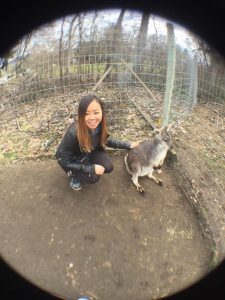
Hello! My name is Miriam Chen and I am currently a third year student in Nutritional Sciences. I want to pursue my passion as a nutrition consultant and possibly a personal trainer. Growing up with my grandmother who was diagnosed with diabetes made me want to help those who are in need of a well-balanced diet plan. I am also interested in learning about sustainability and how to be more self-sustain in order to help with the environment. Aside from school and work, during my free time, I enjoy going hiking and doing outdoor activities.
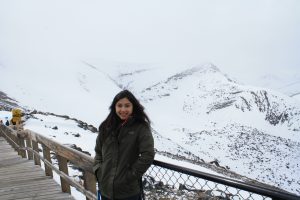
Hello there!
My name is Raisa Aulia Andriani and I’m a third year Global Resource System major at UBC. My deep interest in human health leads me to design and focus my studies in global health and nutrition. By pursuing this degree, I am hoping to integrate nutritional aspects to contribute and improve the health of an individual and community. I personally believe that our physical, emotional and environmental surroundings play a part in our wellbeing. Because, like the food system, everything is connected! Apart from school and work, I like to spend my leisure time reading, traveling and exploring new things. I’m looking forward to be a part of this Galiano island community project!
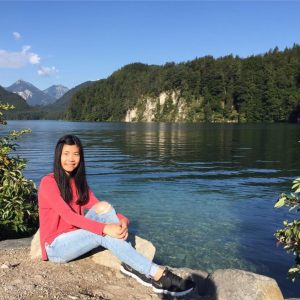
Hello! My name is Rossie Luo. I am a third year food, nutrition and health major at UBC looking to pursue a career as a dietitian. Having grown up feeling overwhelmed by the numerous food options available and seeing people who think they eat healthy but end up developing dietary-related diseases, I decided to study nutrition and use my knowledge to help people make better food choices. I am excited about the opportunity to learn about the nutrition and sustainability aspects of a different food environment and the experience of working with community members as a “food expert” in the Galiano project. Apart from school, I enjoy travelling, reading and exploring good foods.
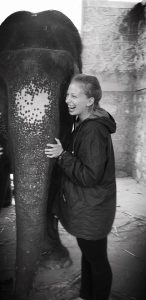
Hello! My name is Anna Baumgartel and I am a fourth year Global Resource Systems Major. I am integrating International Nutrition and Food and Resource Economics as my main focus for my degree. I am very passionate about international development and ending the cycle of poverty. My hopes after graduation are to pursue a career in the non-profit sector and make philanthropy my full time job. Apart from school I am involved with Free the Children, I love to coach volleyball and I am very involved in the Autism community as I work as a Behavioral Interventionist, coach Special Olympics and work for the Canucks Autism Network.
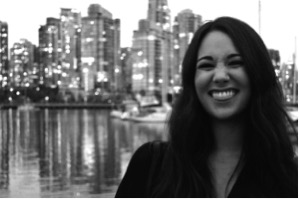
Hello! I am Lia Monteferrante and I am a fourth year LFS student at UBC. I grew up mostly in Rochester, New York. I came out here to British Columbia because of my love for nature and the mountains. I am currently studying Food and the Environment to help me better understand a way to feed our exponentially growing population in a sustainable, environmentally friendly way. I am very lucky to now live in a city that is so conscious about personal and environmental health. This consciousness makes a more symbiotic community between nature and people. My goal is to expand this knowledge to the rest of Canada and the United States. Knowledge is power.

Hi! My name is Lily Li and I am currently a third year LFS student at UBC. My love for food grew in throughout high school, especially during my Food and Nutrition classes. Originally, I was in the faculty of Sciences during my first year because I thought of it as a safer and more general route. By the end of that year I realized that my interest for food was as strong as ever, so I made the decision to transfer to Nutritional Sciences in LFS. On top of making food (especially baking), I’m fascinated in the effects that various components of food have and how it interacts within each individual. I’m also a VERY curious person, which is why I love trying out new things, but mostly because I strongly believe that first hand experience is everything.
Group interests, goals, reasons for choosing this project, and what we want to gain from our experiences in LFS 350
So what brought us together? Aside from being in the same LFS 350 class, we all share similar interests related to nutrition, health, and environmental sustainability, which also gives this project a certain appeal. While most of us grew up with the luxury of having access to food almost any day of the year, learning about how smaller islands (such as Galiano Island) cope with the unreliability of food import from other places via ferry would be quite the experience! What further inspired us to explore the food justice on the island was Dixon’s article, “Learning to see food justice”, where Dixon suggest that food is not a personal choice and some people (such as the residents on Galiano Island) may be deprived of nutritious food due to inequality access. Also, being able to explore the island and the community is a great chance to investigate local sustainability knowledge and practices that can be transferred to our own food system.
Luckily, a workshop on growing citrus and stone fruit falls on the weekend that we are visiting the island. Not only it is a wonderful experience, but it can also provide us with more insight on one of the ways people on the island produce agriculture to help us gain a better understanding on how sufficient and efficient Galiano Island’s agricultural activities are. Working on this project for LFS 350 is a great way to develop communication skills, both with people of profession, and students or colleagues. We can also develop our skills of collaborating with community members and improve food justice by maximizing existing assets.
Project Objectives and Community Organization
Now onto the Weekend at Galiano Island…
The main objective of our project is to see how much of an impact the unreliability of ferries has on the food security of people on the island. Doing research is one thing, but physically going there to see first hand on how food circulates on the island and being able to talk to people about their personal experiences, would provide insight that the internet may not be able to offer! One thing that we do know is that Galiano Island imports food from other places. Doing so would help the residents in maintaining a well-balanced diet by increasing the variety of food options on the island, as the land might only be suitable for growing certain types of crops.
Another objective is to explore the self-sustainability of the residents. We want to take a look at the limiting factors, such as water resources, diversity of food systems, agricultural lands available, and how would these factors effect the ability to grow food on the island. There has to be ways that the residents address these food security issues, and unique strategies they developed along the way as a community to improve their food accessibility and availability. Katherine W. Phillips writes about how “people who are different than one another […] bring unique information and experiences to bear on the task at hand.” in her article “How Diversity Makes Us Smarter.” This speaks true to our case. Compared to living in Vancouver, Galiano island seems so small and too difficult to get resources. People living there have found ways around challenges – challenges that probably wouldn’t have crossed our minds much at all.
Interacting with the community will be an amazing learning experience… Especially since we have the pleasure of working with the Galiano Food Program within the Galiano Club. This community club is located on the South side of the beautiful Galiano Island, where most of the residents live. The Galiano club offers a variety of food programs such as potluck picnic and “Soup and Bread for Everyone” where the community kitchen offers $5 unlimited fresh soup and bread. In addition to food programs, the community club also offers game nights and competitions to bring the community together.
First impressions of our process so far…
In this section we would like to share our thoughts from the readings and video. We are thrilled about the direction this project is taking. Our group cohesiveness has propelled a wonderful start to our project. Communication and support has been plentiful to promote positive contact with our community stakeholder. Through Ernesto Sirolli’s TED talk video, “Want to Help Someone? Shut Up and Listen!”, we acknowledge that when we arrive in a new place, we instantly become a group of “outsiders” to the locals and it is crucial that we respect their culture and environment. In other words, Galiano Island may offer us a different culture than Vancouver. For us to respect the residents on the island is to accept their culture without any judgements. During our meeting with the community stakeholder, Jane Wolverton, has informed us a little bit about life on the island. For example, she mentioned to us that transportation is limited, whereby, there is no taxi service. In order to get around, the residents either walk, cycle, or hitchhike. She had also informed us that there is no cellphone tower on the island, so it might be difficult to get signal coverage. Additionally, unlike the food system in Vancouver, we need to free our mind from the assumption that most residents purchase the majority of their food from grocery stores, in order to make room for a knowledge exchange between ourselves and the Galiano community. These are a few examples of differences that we may encounter on the island later, and we should not ponder upon the differences but to embrace and enjoy them.
For our hope in the future, we have considered Sirolli’s point about openly listening to our peers and becoming friends with whomever we work with. He mentioned that listening and understanding to the community stakeholder’s need and vision would advance the development of the project. After watching Sirolli’s video, our group have also realized that planning does not guarantee success. A great plan is the first step to climb the success ladder, but without considering few characteristics such as respecting our partner, maintaining their confidentiality and trust, and sincerely doing the task, our goal would not be achieved. Moreover, we have also considered what Will reminded us in lectures: to embrace the uncertainty. No matter how well we plan, something unexpected could always happen. And when the unexpected happen, we have to try to embrace and do something about it rather than being frustrated over what happened. Another interesting topic brought up by Douglas Medin, Carol D. Lee and Megan Bang in “Point of View Affects How Science Is Done”. The authors claim that we must carry multiple mindsets in order to draw widely accepted conclusions. We call it multiple mindsets because there are six of us in the group and some of us are bound to have different opinion than the rest. It may bring conflict but we will try to respect the different opinions and critically assess the perspectives, then draw a conclusion that all of us will agree upon. This is what we mean by widely accepted conclusion. Overall, we will keep in mind that this is an asset-based community development project. We will focus on the strengths of the facilities they have in place that contribute to a socially just and food secure environment. By collaborating with the local residents, we hope to combine the knowledge from different fields we are studying as well as the experience the community has gained through long-term practice to further improve food justice on the island.
1 Thought.